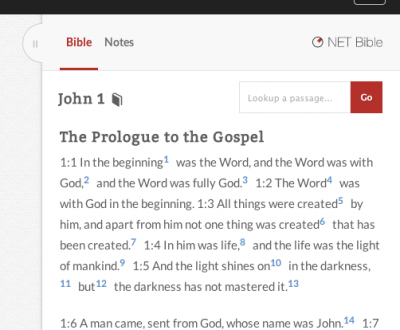A reader recently left a comment in our comments database with the following question:
The NET Bible translation of Colossians 2:13 begins “And even though.” I assume this is a translation of the KAI that leads into the statement that follows, because there is nothing else in that statement that I’m aware of that could yield the meaning “even though.” But why not take KAI as epexegetic or explanatory? The translation then could be “that is.” Since the statement that follows the connecting KAI has to do with being “co-quickened” – a term that seems to parallel the “co-raised” in the previous verse – it would seem reasonable that Paul is further explaining what he had just stated. Is there any reason to reject such an understanding of Paul’s meaning?
A reader recently left a comment in our comments database with the following question:
The NET Bible translation of Colossians 2:13 begins “And even though.” I assume this is a translation of the KAI that leads into the statement that follows, because there is nothing else in that statement that I’m aware of that could yield the meaning “even though.” But why not take KAI as epexegetic or explanatory? The translation then could be “that is.” Since the statement that follows the connecting KAI has to do with being “co-quickened” – a term that seems to parallel the “co-raised” in the previous verse – it would seem reasonable that Paul is further explaining what he had just stated. Is there any reason to reject such an understanding of Paul’s meaning?
This is a good question which deals at the same time with grammar and logic. The best way to answer is to examine the participle that is in the first clause of v. 13. The Greek word is ὄντας, which is a participle from the verb εἰμί, “I am.” Participles are very flexible in Greek and can have any of several different nuances when used adverbially. Because of the inherent difference between the assertion in the first half of v. 13 (“you were dead in your transgressions”) and the assertion of the second half (“he . . . made you alive”), this participle is best taken as concessive, meaning that it asserts the main verb is true despite the assertion of the participle. There are different ways to translate this idea into English; “although” is pretty common but here we chose “even though.” So to respond to the question from the reader, the words “even though” are not a translation of the connective καί but of the concessive participle ὄντας. Later in the verse we include the word “nevertheless” to help reinforce this same nuance, as indicated by the note to this effect.
Now more to the point of the reader’s question is whether καί here should be simply connective (“and”), as we have it in the NET Bible, or whether it should be explanatory (“namely, that is”). Again, logic comes into play here. Another way to ask this: Is v. 13 an explanation of v. 12? It is certainly possible that Paul means to explain being “raised with Christ” in terms of being “made alive with Christ”; the simple juxtaposition of the ideas could bring this about. Against this in my view, however, is the fact that being “co-quickened” does not really add any meaning or explanation to being “co-raised,” especially since in v.12 Paul mentions burial. The image in both verses is of coming to life from a state of death. The terms Paul uses are essentially synonyms which describe the same reality; he simply looks at the reality from two different angles. So on that basis I would argue that the καί here is simply connective.
In addition, it makes sense that the καί serves simply to link the two similar main verbs of v. 12 and v. 13 and not to explain. In the flow of the argument Paul asserts that the Colossians need to be wary of anyone who would lead them astray with false teaching (v. 8), and then he explains why (vv. 9-15). These two sentences explain from two different angles the vivification which takes place in the life of the believer, in the midst of several other reasons. Thus it is better to see v. 12 and 13 as two equal assertions among others which explain his warning.
Lastly, a form of Occam’s Razor can be employed here. Taking the καί as connective, not explanatory, is simpler while still making sense of the passage. It is certainly possible that the conjunction here is explanatory, but it is not the most probable way to understand what Paul is doing. On that basis the current NET translation is better.
This is a good question and worthy of consideration. It is always helpful to discuss these matters to hone our understanding of Scripture, even if we might ultimately disagree as to the details.
Post Views: 332

